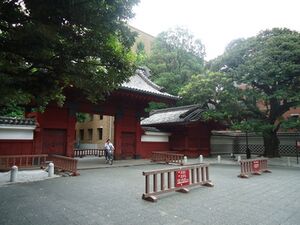Difference between revisions of "Kaga Edo mansion"
From SamuraiWiki
Jump to navigationJump to searchm |
|||
| Line 1: | Line 1: | ||
[[File:Akamon.JPG|right|thumb|300px|The Akamon ("red gate") which now serves as a gate to the [[University of Tokyo]] main campus]] | [[File:Akamon.JPG|right|thumb|300px|The Akamon ("red gate") which now serves as a gate to the [[University of Tokyo]] main campus]] | ||
| − | *''Japanese'': | + | *''Japanese'': 加賀江戸藩邸 ''(Kaga Edo hantei)'' |
The main [[daimyo yashiki|mansion]] of [[Kaga han]] in [[Edo]] covered roughly 267 acres, filled with warehouses, barracks, residences, gardens, and schools, and inhabited by as many as 30,000 people.<ref>[[Albert M. Craig]], ''The Heritage of Japanese Civilization'', Second Edition, Prentice Hall (2011), 72.</ref> The space is today the main campus of the [[University of Tokyo]]. | The main [[daimyo yashiki|mansion]] of [[Kaga han]] in [[Edo]] covered roughly 267 acres, filled with warehouses, barracks, residences, gardens, and schools, and inhabited by as many as 30,000 people.<ref>[[Albert M. Craig]], ''The Heritage of Japanese Civilization'', Second Edition, Prentice Hall (2011), 72.</ref> The space is today the main campus of the [[University of Tokyo]]. | ||
Revision as of 09:31, 26 September 2014

The Akamon ("red gate") which now serves as a gate to the University of Tokyo main campus
- Japanese: 加賀江戸藩邸 (Kaga Edo hantei)
The main mansion of Kaga han in Edo covered roughly 267 acres, filled with warehouses, barracks, residences, gardens, and schools, and inhabited by as many as 30,000 people.[1] The space is today the main campus of the University of Tokyo.
The lord of Kaga han typically arrived in Edo with an entourage of 8,000, leaving roughly 4,000 behind afterwards to help manage his estates.
The famous red gate (akamon) still standing on the university campus was originally built in 1827 for the occasion of the marriage of Kaga daimyô Maeda Nariyasu to Yôhime, 21st daughter of Shogun Tokugawa Ienari.[2]
References
- ↑ Albert M. Craig, The Heritage of Japanese Civilization, Second Edition, Prentice Hall (2011), 72.
- ↑ Craig, 78.; "Embroidered Costume on Pale Blue Crepe," Seisonkaku official website.